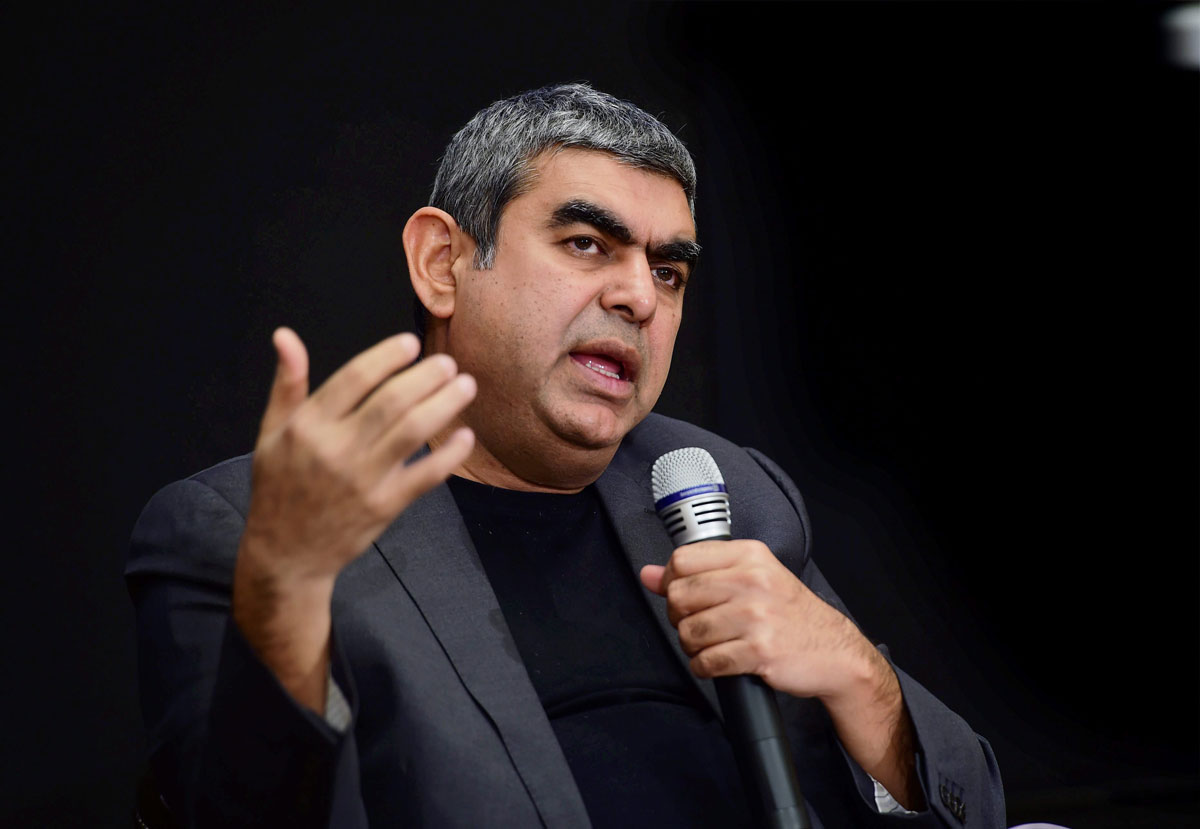Infosys Q4 Numbers Disappoint, CEO Sikka Still Aspires to Reach $20B by 2020
Infosys CEO Vishal Sikka addressing a press conference to announce the annual financial results of the company, at its headquarters, in Bengaluru, April 13. (Shailendra Bhojak/PTI)
@Siliconeer #Siliconeer #India #Infosys #VishalSikka #TiESV #Tech – Infosys, India’s second-biggest software exporter, April 13, announced plans to return Rs 13,000 crore from its cash pile to shareholders after it reported an almost flat net profit in the March quarter and sales outlook that fell short of estimates.
Yielding to pressure from a group of founders and former executives, the company announced a share buyback program and a pledge to raise dividends.
It also appointed Ravi Venkatesan, an independent director, co-chairman in a bid to address the founders’ corporate governance concerns.
It will begin to pay 70% of annual free cash flow as dividend compared to a previous policy of sharing up to half its post-tax profit.
For the January-March quarter, Infosys reported a 0.2% rise in consolidated net profit at Rs 3,603 crore while revenue grew 3.4% to Rs 17,120 crore.
In 2017-18 (April 2017 to March 2018), the company expects revenue to grow 6.5% to 8.5% in constant currency terms.
Infosys shares closed at Rs 931.40, down 3.86% from previous close on the BSE.
“For 4QFY2017, the results were below expectations, on the sales front the company has posted revenue of $2,569 million v/s expectations of $2,589 million,” Angel Broking VP Research (IT) Sarabjit Kour Nangra said.
On a sequential basis, Infosys’ net profit fell 2.8% while revenue declined 0.9%.
“Unanticipated execution challenges and distractions in a seasonally soft quarter affected our overall performance,” Infosys CEO Vishal Sikka said.
He, however, declined to elaborate on the statement, merely saying, “…I need not tell you what the distractions have been. It is our job to manage the company to lead the company in the times that we are in.”
Sikka is grappling with twin problems of high-profile founders led by N.R. Narayana Murthy publicly criticizing governance style, including salary hikes to top executives, and a visa crackdown by President Donald Trump that will make it harder for companies like Infosys to send employees to work in the U.S.
He added: “Looking ahead, it is imperative that we increase our resilience to the dynamics of our environment and we remain resolute in executing our strategy, path to transform Infosys and drive long-term value for all stakeholders.”
Infosys, which has about $6 billion on its books, follows industry peers Cognizant and Tata Consultancy Services in announcing share buyback.
Cognizant had announced a $3.4 billion buyback while TCS is returning Rs 16,000 crore to its shareholders.
Two of Infosys’ former CFOs—T.V. Mohandas Pai and V. Balakrishnan—had recently exhorted institutional investors to raise questions about the huge cash pile on the company’s books, saying investors have an obligation to protect their investment.
Infosys CFO M.D. Ranganath said the company is focused on efficiency and margins.
“Capital allocation policy clearly says (it will be) up to Rs 13,000 crore. This takes into account our cash needs for the next couple of years,” he said, adding that this will leave the company with about $4 billion on its balance sheet.
Infosys earnings set the tone for other technology companies, with TCS slated to report its results on April 18 and Wipro on April 25.
Market watchers said Infosys’ outlook for 6.5-8.5% revenue increase for 2017-18 is disappointing as peers like Cognizant have guided for higher growth.
Cognizant, which follows January-December fiscal, expects its revenue to grow 8-10% in constant currency terms during 2017.
In US dollars terms, Infosys net profit was up 1.8% at $543 million for the March quarter while revenue grew 5% to $2.5 billion.
For the full year, net profit grew 4.3% to $2.1 billion while revenue was up 7.4% to $10.2 billion.
The board has recommended a final dividend of Rs 14.75 per share for 2016-17.
Infosys added 601 (net) employees in the March quarter, taking its overall headcount to 2,00,364 people. Its attrition stood at 17.1%.
On U.S. visa-related concerns, Sikka said the role of visas in the tech industry has become too strong over the last 15 years.
“We have to deliver value to our clients… We have to live with the visa problem,” he said, prescribing “a healthy mix of local and global talent” to overcome such challenges.
Asked about the $20 billion revenue target by 2020, Sikka said it continues to be an “aspiration” for the company.
“With the performance that we have seen in the last few quarters, obviously it was already a difficult thing, now it is an incredibly difficult thing… (but) it is something we continue aspire to be,” he said.


